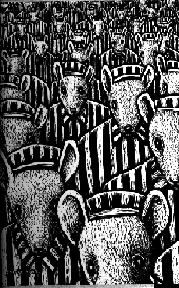 I am ashamed that I haven't read this before. I was a great devotee of the movie when I was young and it wasn't until I was a teen that I even realized there WAS a book. But even then, I remember checking it out once and trying it, but just preferring the movie. Silly girl. The book is just as good and definitely more profound. Or, maybe, I have just lived enough now to see that it IS profound.
I am ashamed that I haven't read this before. I was a great devotee of the movie when I was young and it wasn't until I was a teen that I even realized there WAS a book. But even then, I remember checking it out once and trying it, but just preferring the movie. Silly girl. The book is just as good and definitely more profound. Or, maybe, I have just lived enough now to see that it IS profound.The last unicorn doesn't know she is the last until she hears a hunter speak the words. Her journey to find out the truth about unicorns in the world leads her on a journey into the depths of the human condition. She gathers with her those who can see her for what she truly is: the kind and bumbling Schmedrick, the Magician, and Molly Grue, the crabby scullery girl. With these two by her side she travels towards the realm of King Haggard and his terrifying Red Bull. What she learns along the way about herself and the ways of humans will change the land forever.
What makes this book such a classic? Is it the complex characters? The unicorn is at once both naive and wise, teaching us what is human by putting words to what we have and what we lack. Is it the magic itself, fleeting and powerful - at the ready for some but tantalizingly fickle with others? Or perhaps it's because it is a tale of finding what is beautiful, old, and good and restoring it to its rightful place - but first having to learn what is worth living and dying for.
The writing is witty, lyrical and powerful. If you have seen the movie, you'll hear voices in your head as you read text that was lifted word for word and put into the movie. But even if you haven't - if you love tales of magic and love, unicorns and heroes - you should open the pages of this one and take the journey. You won't forget it.








